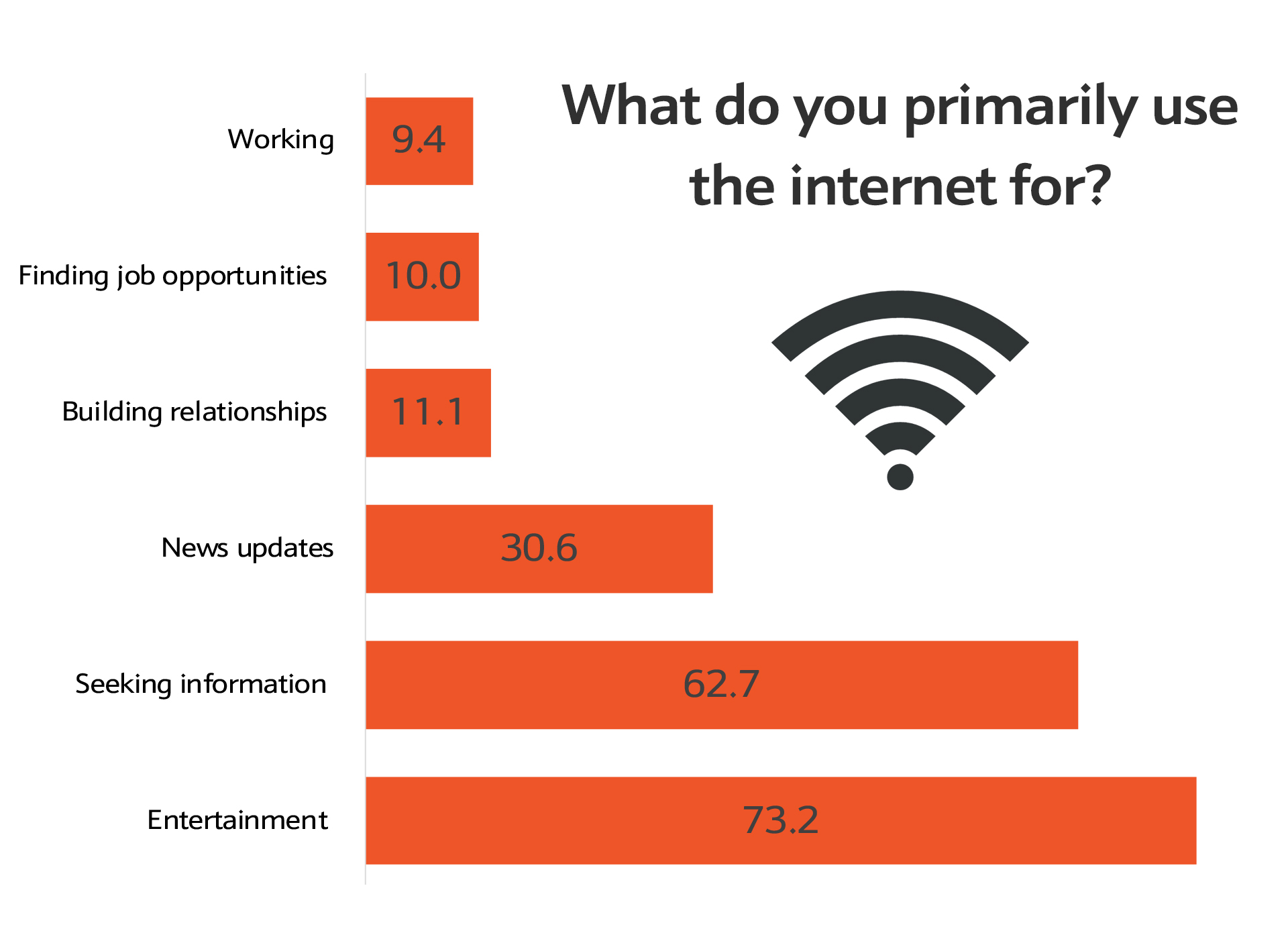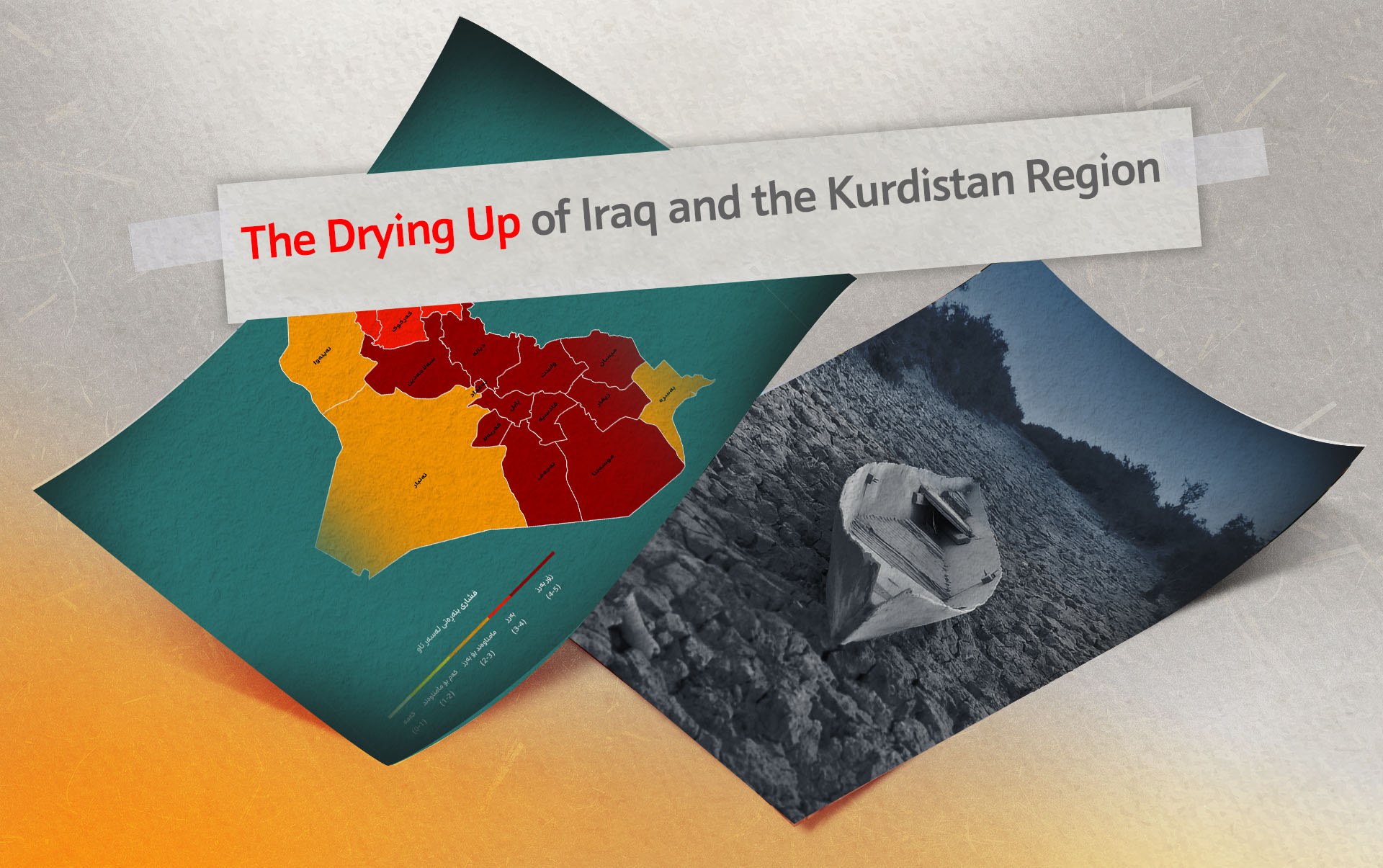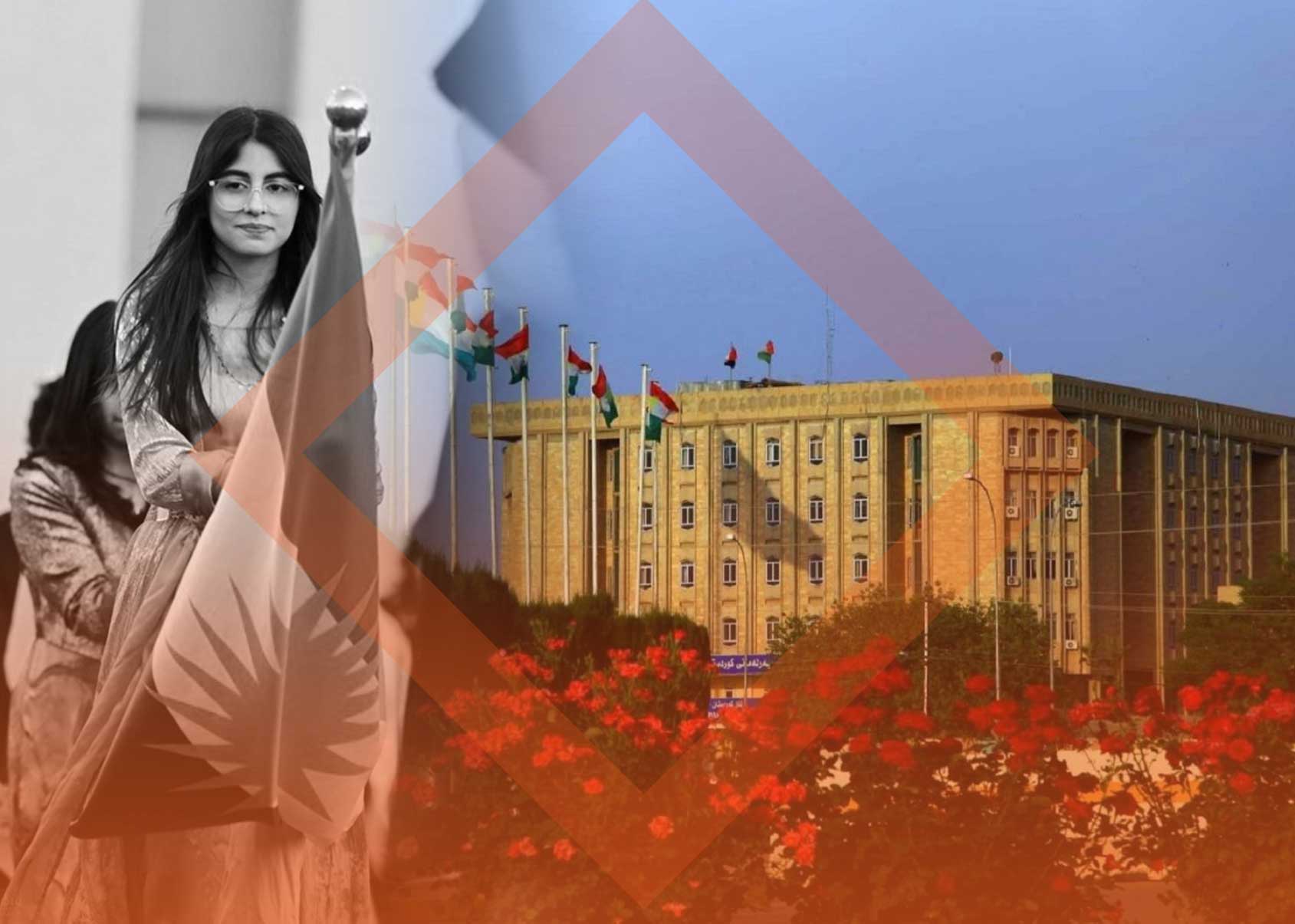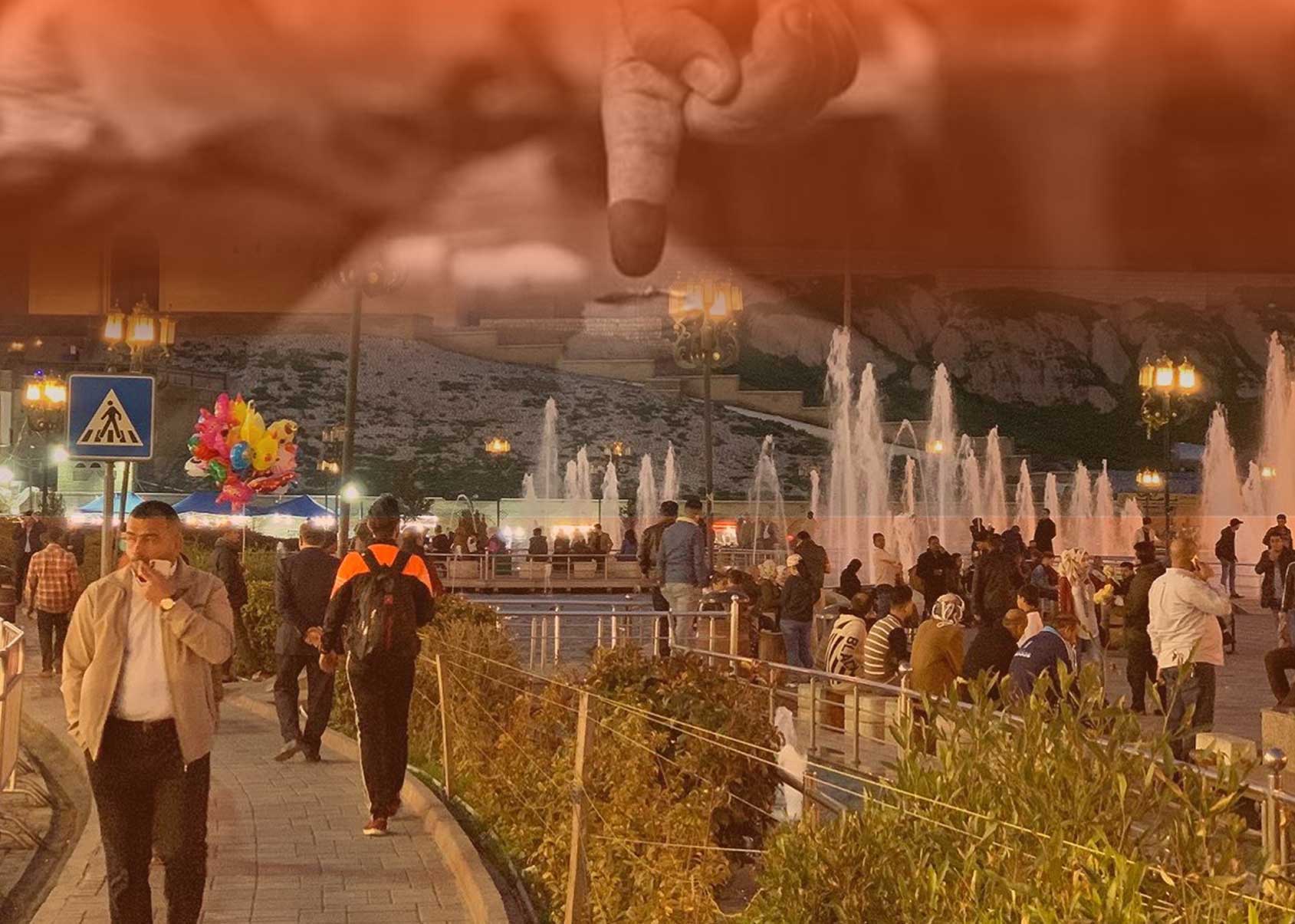The Rudaw Research Center published the third part of the result of the "Youth Perspective in the Kurdistan Region - 2023" which focuses on the Youth perspective on Social Values and Living Conditions and will publish final report of the survey in the coming days.
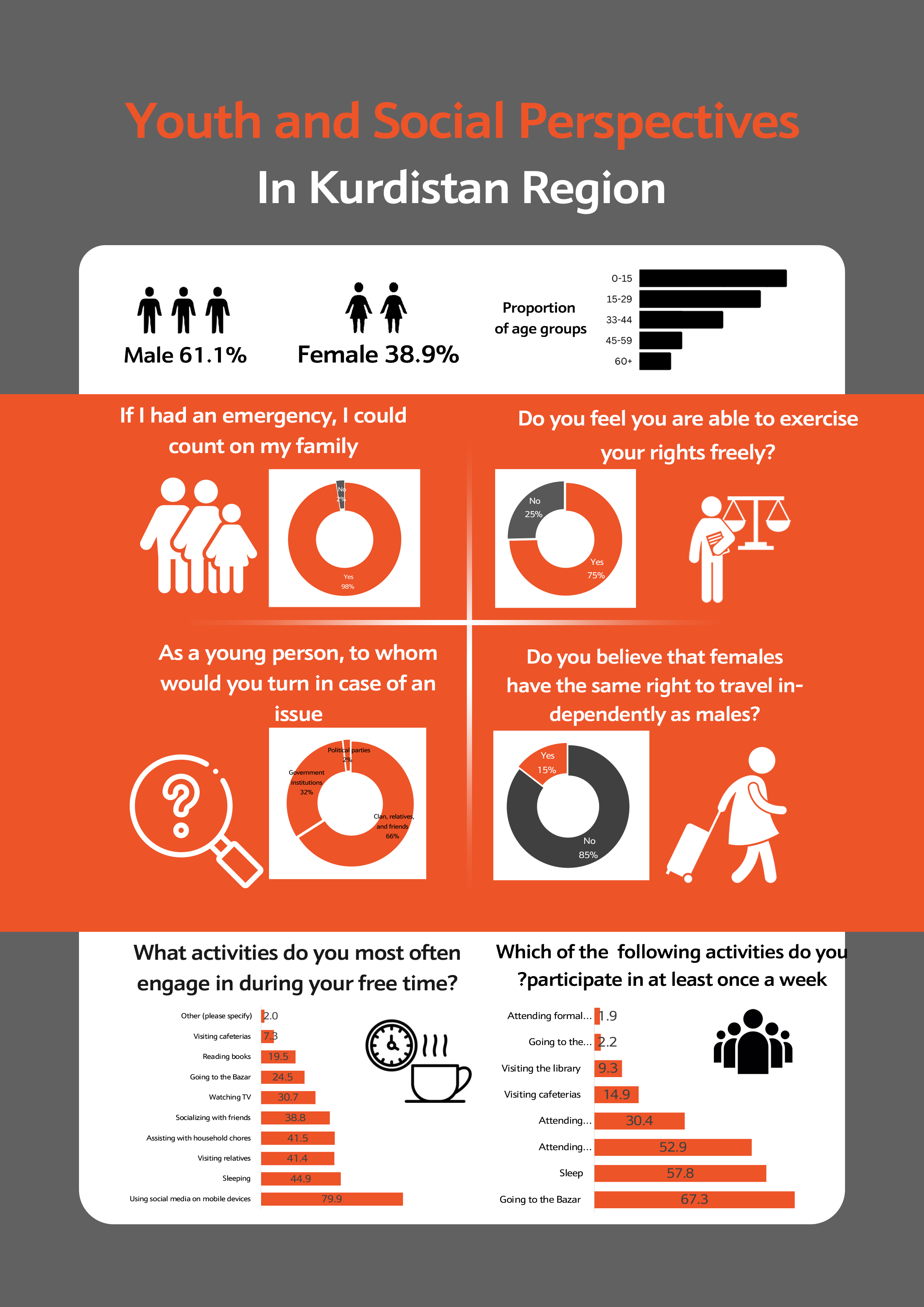
Please Click here to download as PDF
Social Values and Living Conditions
The majority of young people in the Kurdistan Region express a preference to continue living with their families, which typically consist of around six members per household. Regardless of gender, environment, age, or education level, 90.1% of young people aspire to remain with their families in the future. Only 2.4% desire to live with friends, while 7.5% express a desire to live alone. Given the strong attachment to their families, it is important to understand the activities that young people engage in with their families.
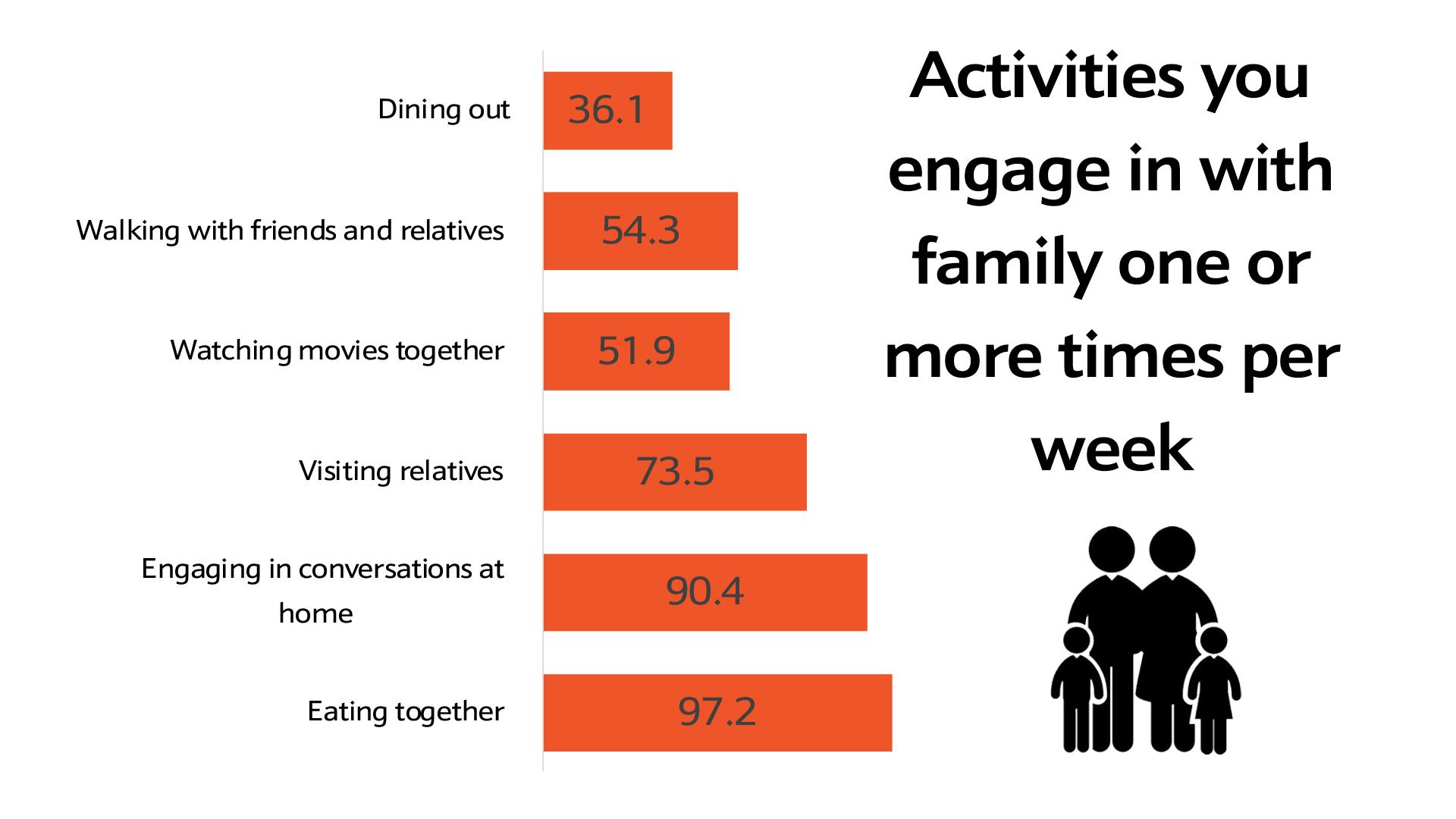
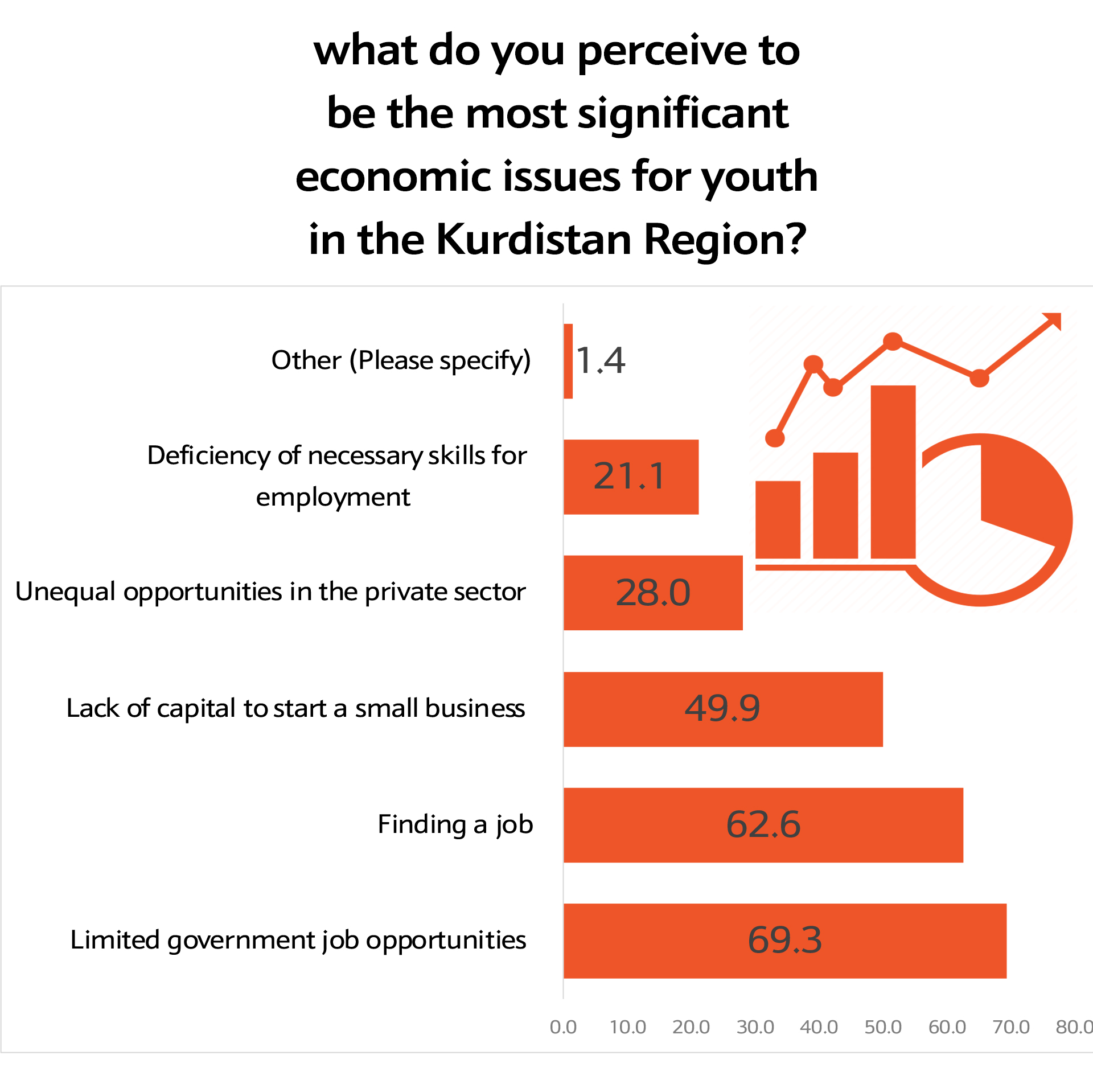
Essential family activities for young individuals include shared meals, conversations, and visiting relatives, going for walks, watching movies, and enjoying outdoor meals together. Teens and young adults also enjoy spending time at cafes, browsing stores, and going on adventures. Interestingly, 21.7% of respondents mentioned attending sporting events with friends as a favoured activity. In terms of social connections, most youth in the Kurdistan Region (75.8%) have between one and five friends, while 18.2% have six or more, and 6.1% have none. A significant percentage of young people (97.1%) indicate that their families are willing to provide support. In case of an emergency, 97% of respondents stated that they would turn to their family for assistance. When asked about seeking help for personal issues, 66% chose tribes and relatives as their preferred option, while only 32.3% would turn to government institutions. A mere 1.8% mentioned political parties as a source of support. These results suggest that tribes and families are perceived to offer better security and support than official government institutions, which may contribute to the perpetuation of tribal culture and the historical phenomena of family-tribal conflicts and revenge.
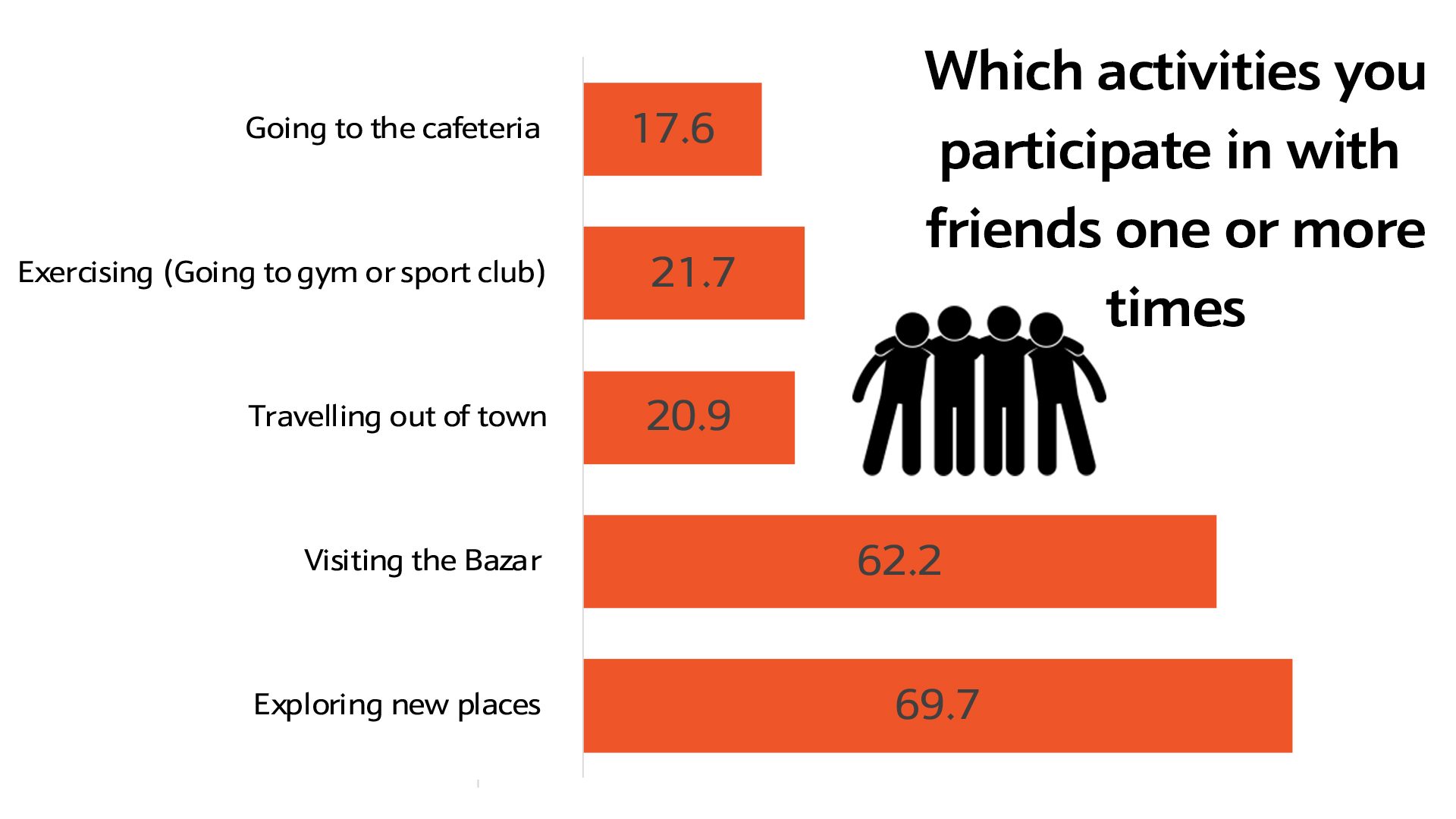
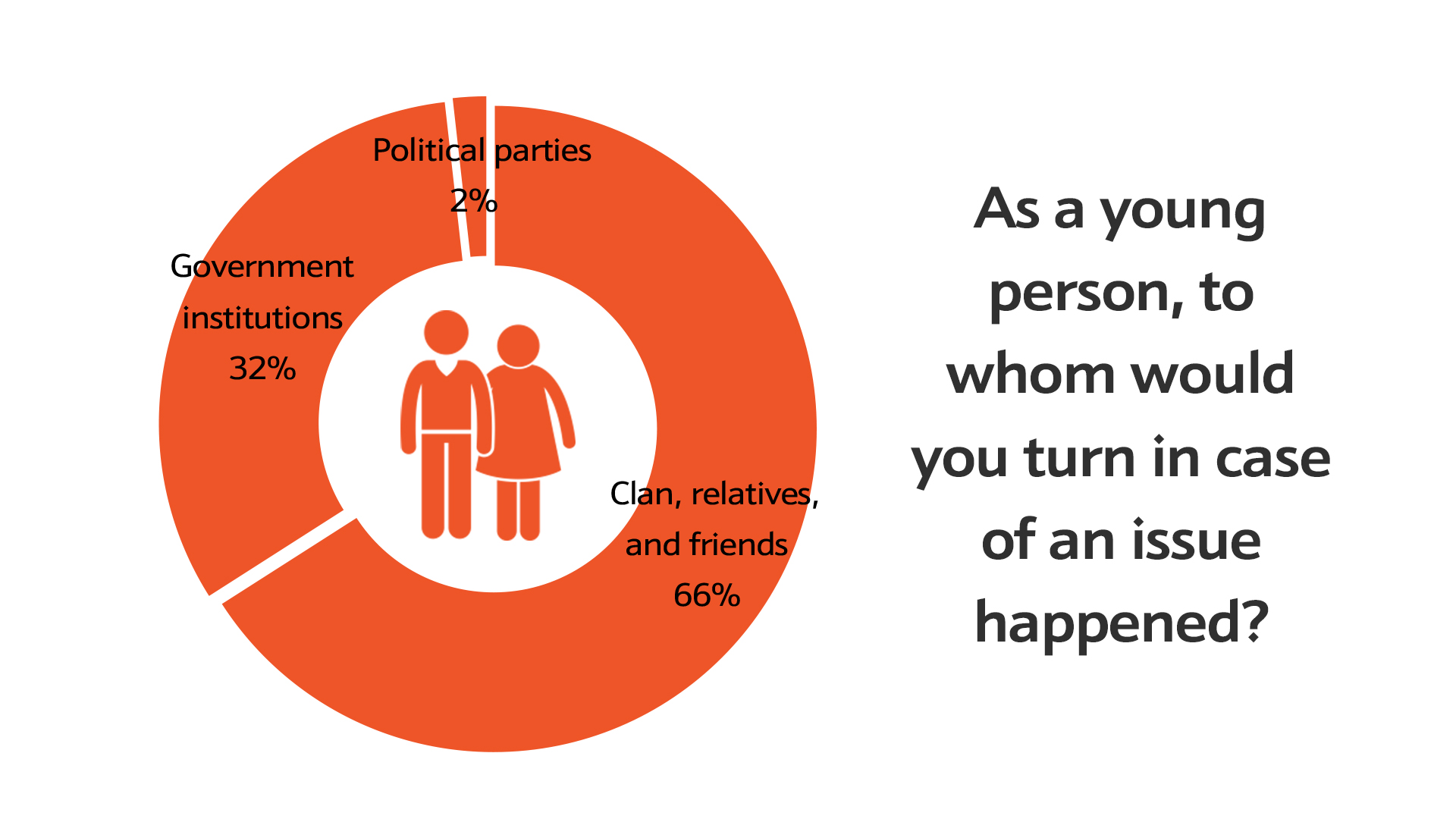
When discussing personal issues, the percentage of young people who feel comfortable confiding in their families drops to 77.1%. Approximately half of the respondents expressed a preference for discussing difficulties with their friends. However, the majority of young people (84.5%) reported having at least one person they trust and can open up to about their concerns, even if it's not a family member or a friend.
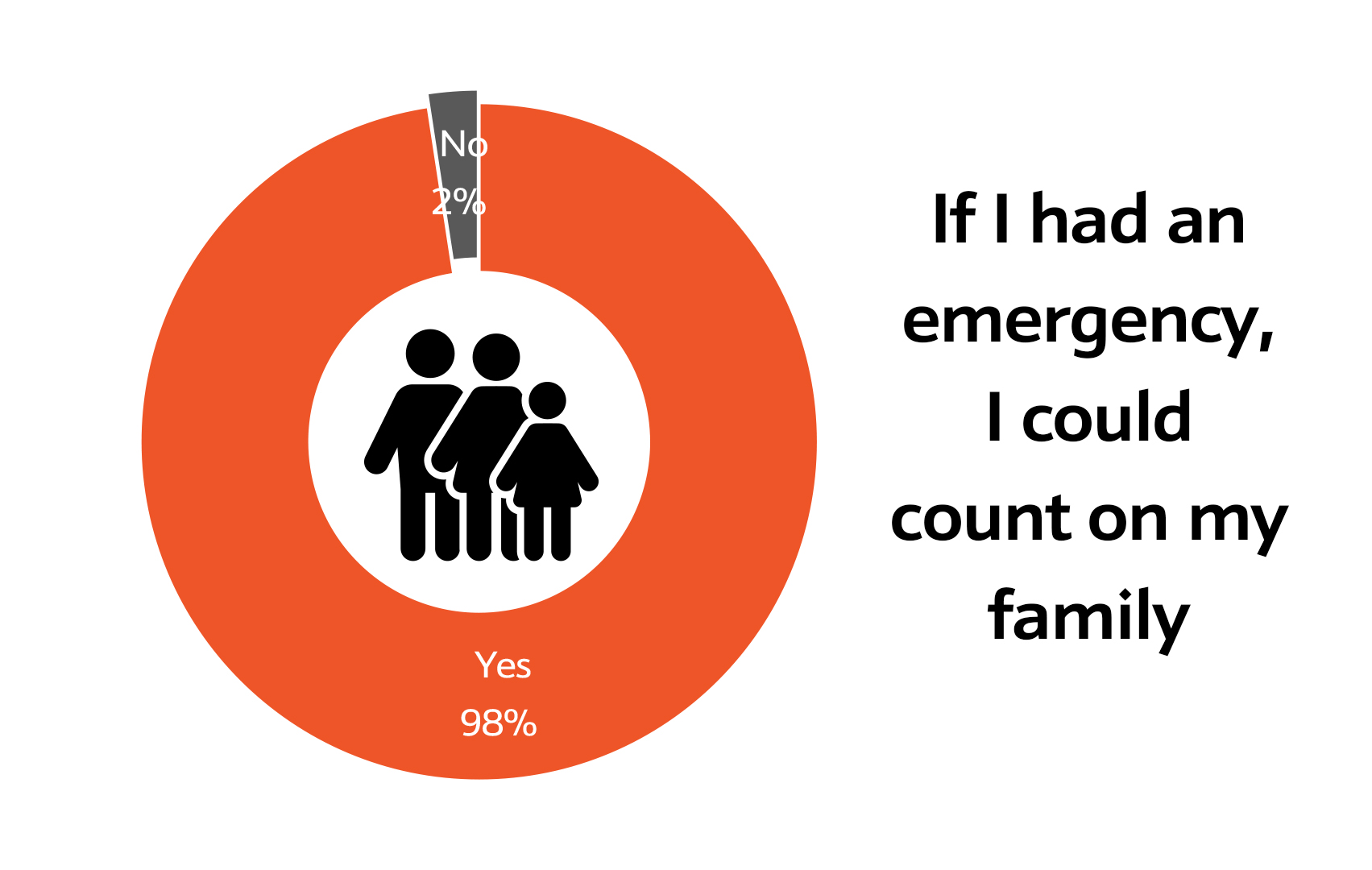
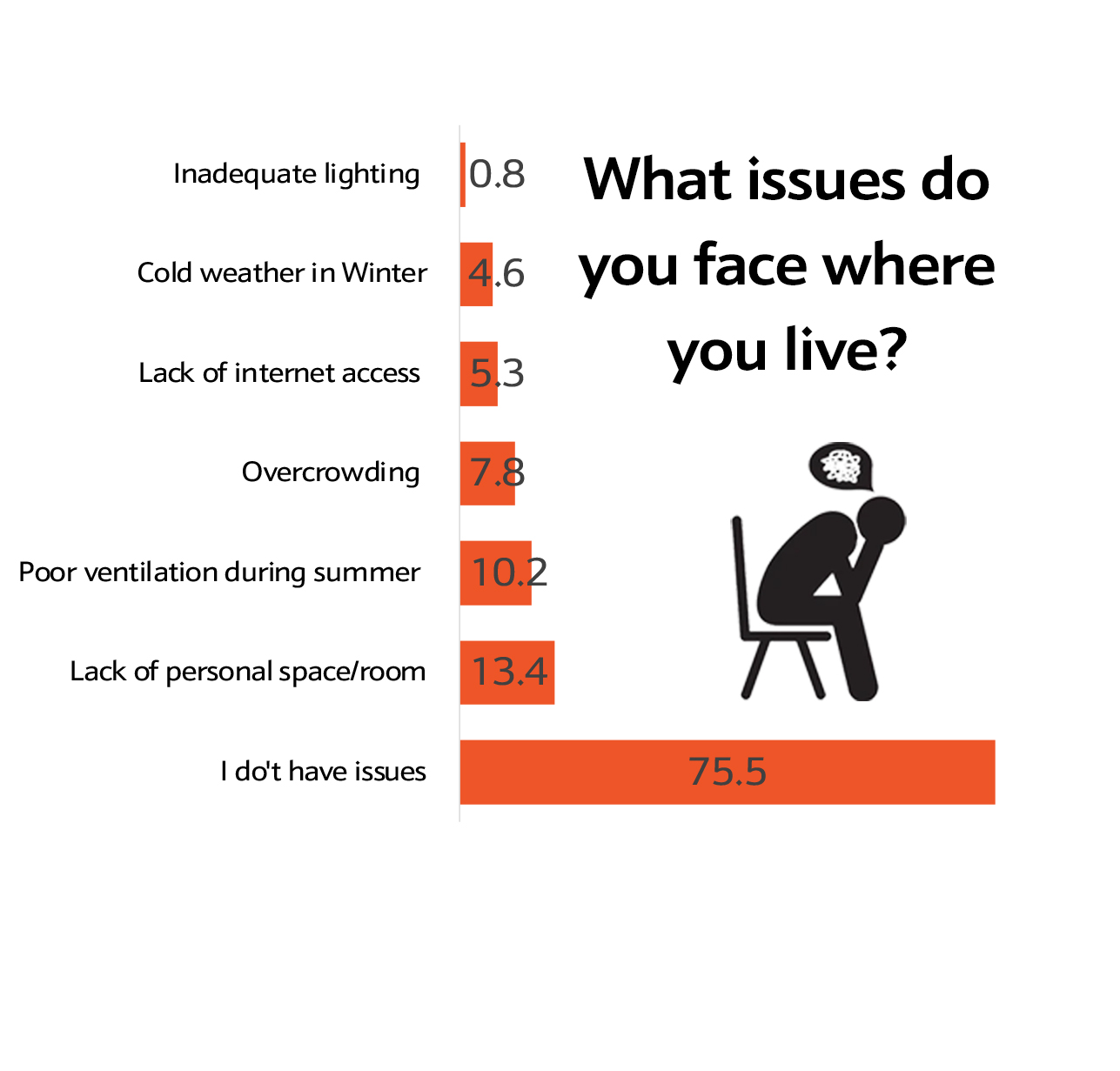
Overall, 75.5% of young people in the Kurdistan Region are content with their current life circumstances. The percentage of individuals who find issues with their accommodations, such as a lack of private rooms or other welfare aspects, does not exceed 13.4%. In terms of financial dependence, 40.6% of young people in the Kurdistan Region receive financial support directly from their families or combine it with their own earnings, which indicates a significant reliance on family for financial stability. Therefore, considering all these factors, it is evident that families play a significant role in shaping the opinions and attitudes of young people in the Kurdistan Region. It is worth noting that a large proportion of parents of young people in the region have a low level of education. For instance, 67.3% of the participants' mothers are illiterate, while 45.8% of their fathers are illiterate and 39.8% have less than a high school diploma. Only 4.7% have a high school diploma. This prevalence of traditional behaviors and thought patterns among families directly impacts the perspectives of young people. In general, young people in the Kurdistan Region hold a positive outlook on social relationships. They express satisfaction with the relationship between neighbors (95.5%) and the cooperation among people (92.6%), irrespective of gender, age, environment, or geographical location. However, satisfaction levels decrease when it comes to cultural and social aspects of life, such as the availability of recreational spaces, parks, cinemas, theaters, libraries, and sports clubs. Some of the complaints appear to be more subjective in nature rather than resulting from specific events. For example, although 9.3% of young people in the Kurdistan Region visit libraries weekly, 71.5% of them express dissatisfaction with the libraries' offerings.
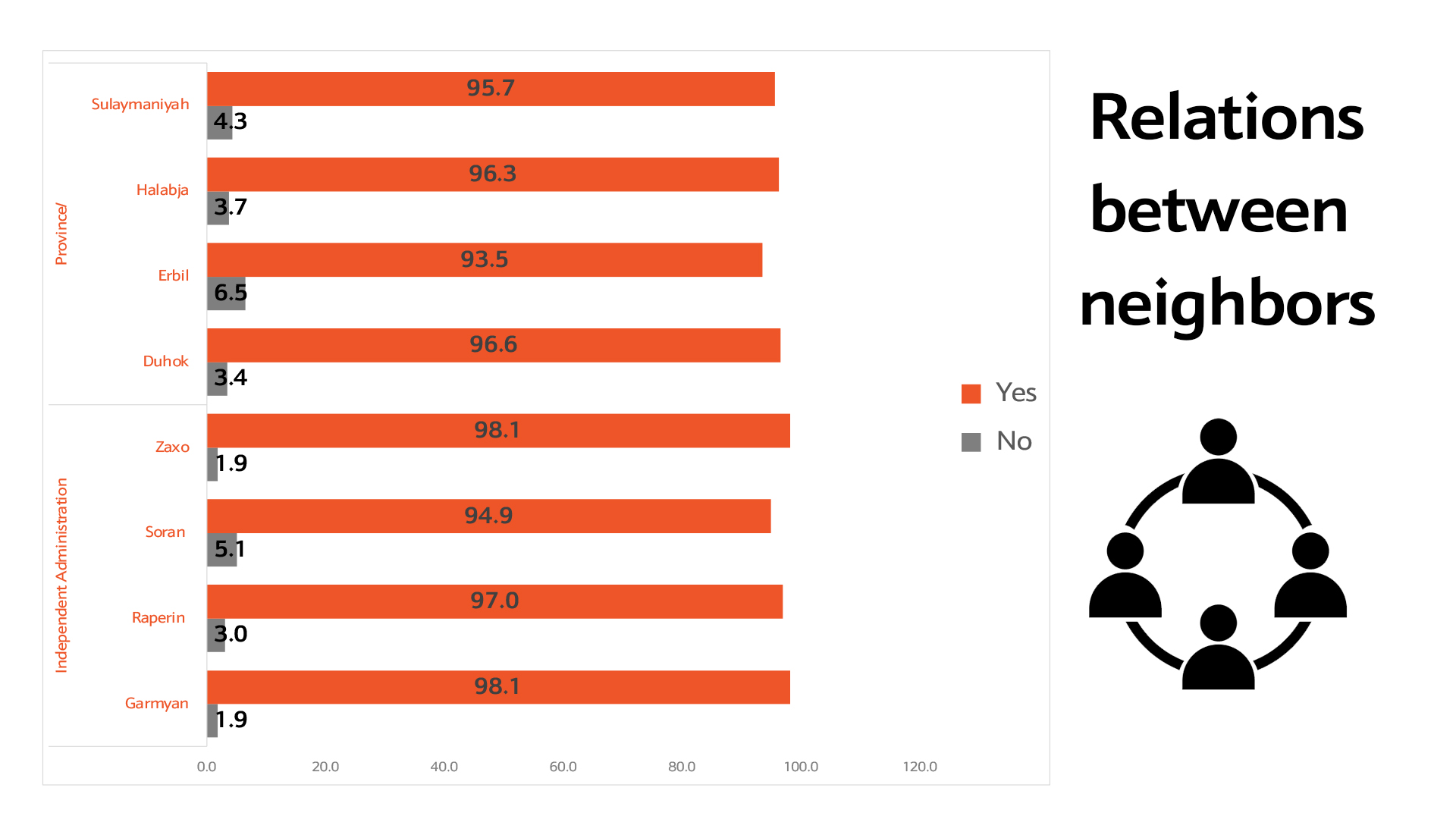
Regarding education, 93.9% of young people in the Kurdistan Region express a desire to continue their education, with only 6.1% losing interest. It is noteworthy that young people are more satisfied with issues related to school and the educational environment than with the overall societal conditions they live in. They exhibit high levels of satisfaction with their teachers, the school atmosphere, the quality of education they receive, and the school and university cafeterias. The Kurdistan Region stands out with a high level of satisfaction with the educational environment, reaching 84.8%. Additionally, 57% of the respondents mentioned staying in the same class for two years or more.
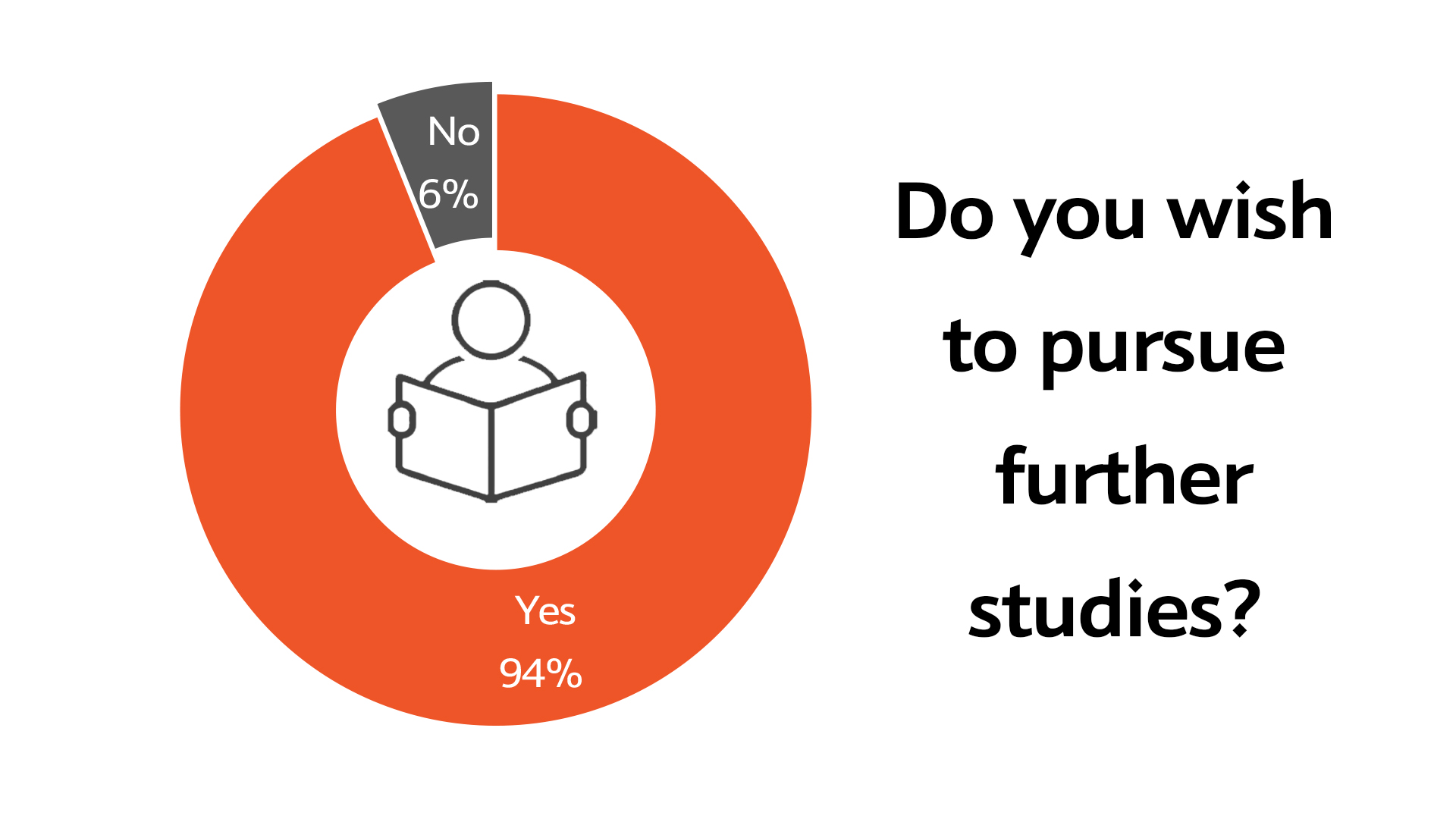
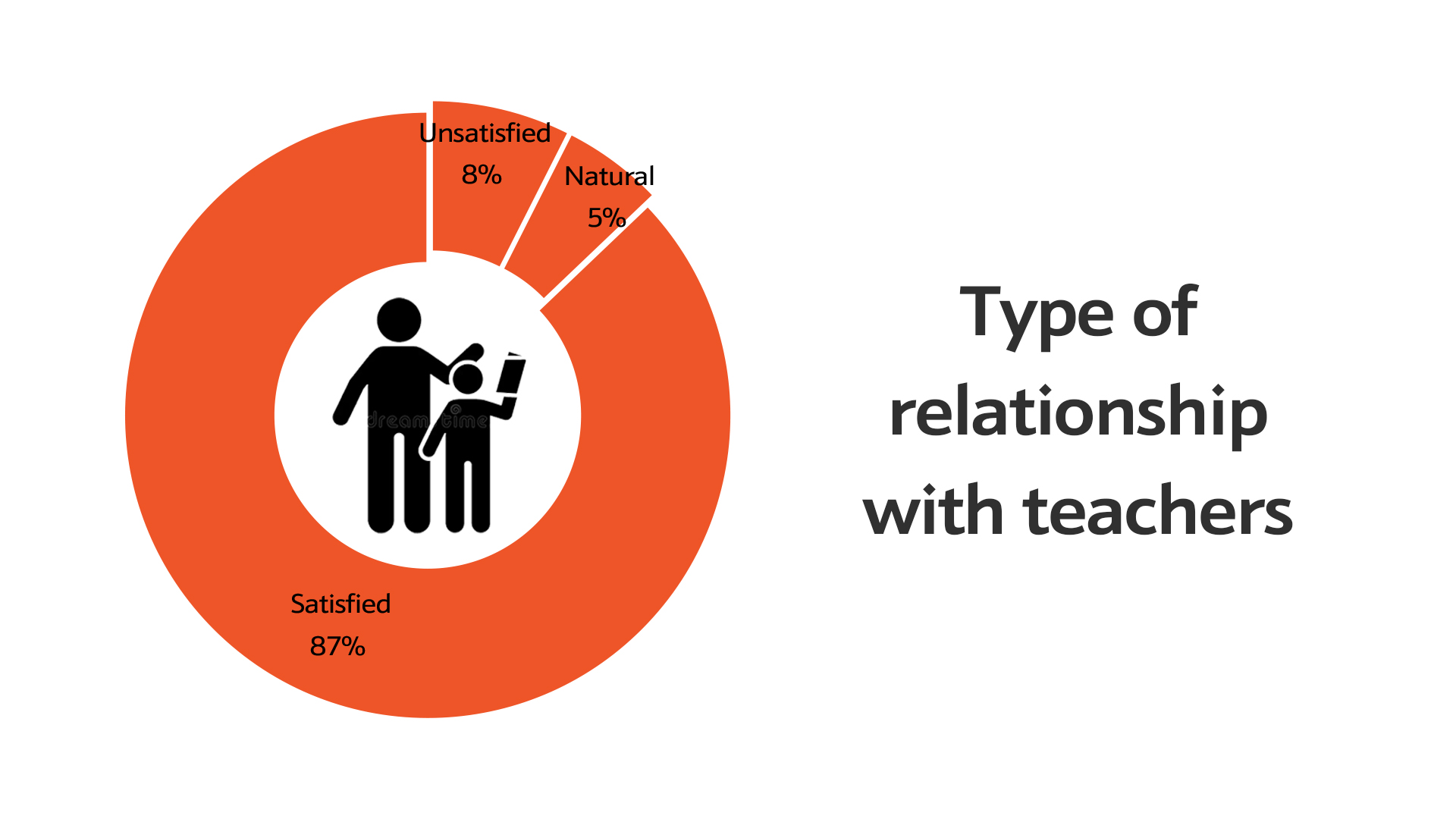
However, this level of satisfaction may appear contradictory to the challenges young people face in finding employment, which they often attribute to difficulties directly tied to education and learning. On a typical weekday, young people in the Kurdistan Region engage in activities such as going to the market, taking naps, and visiting mosques and other religious sites. However, activities like attending concerts, going to the cinema, and visiting libraries are less common. These patterns hold true at both the provincial and independent levels and across different age groups. Notably, 52.9% of youth, of which 72.3% are male, mention visiting mosques as part of their activities.
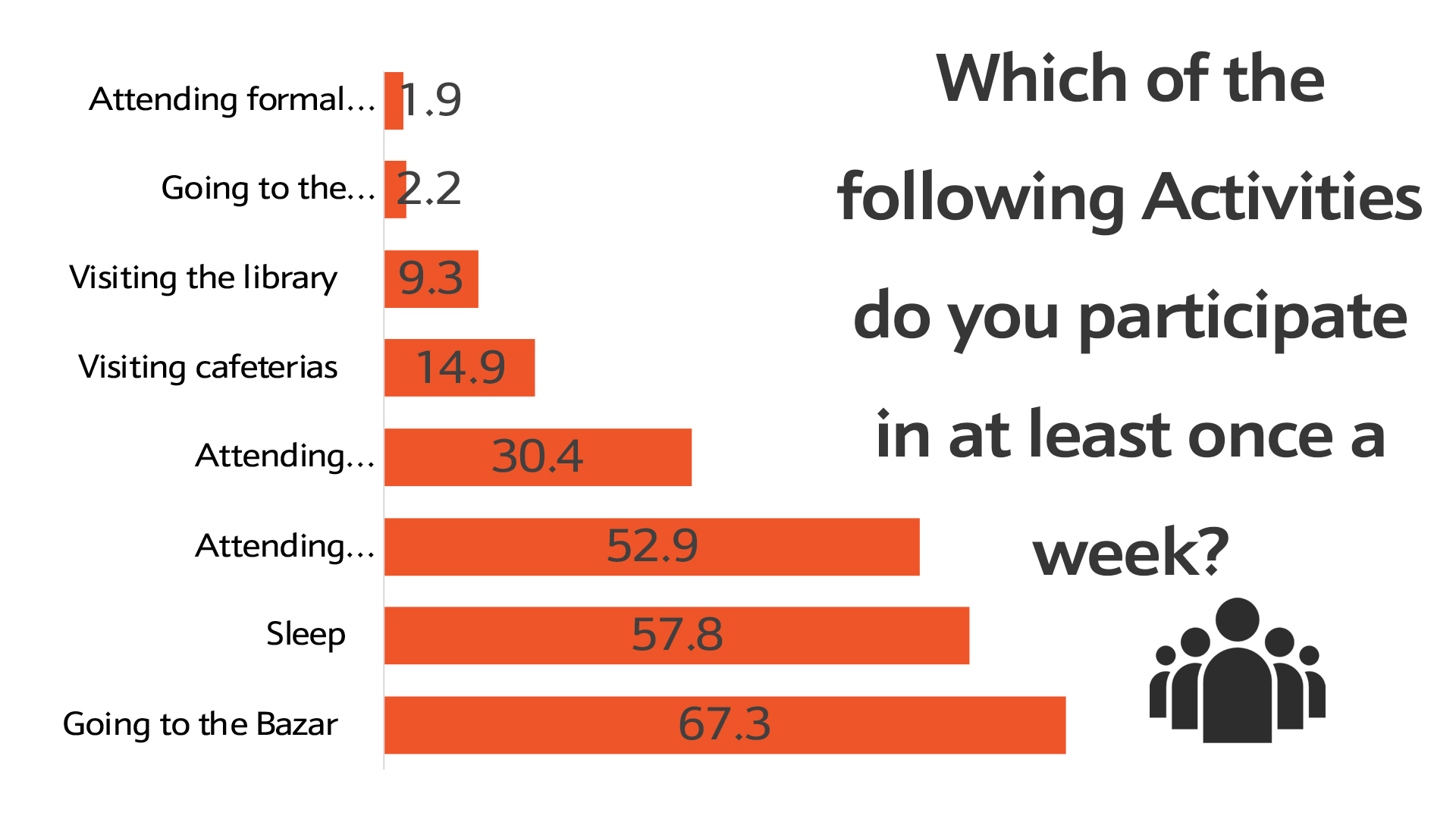
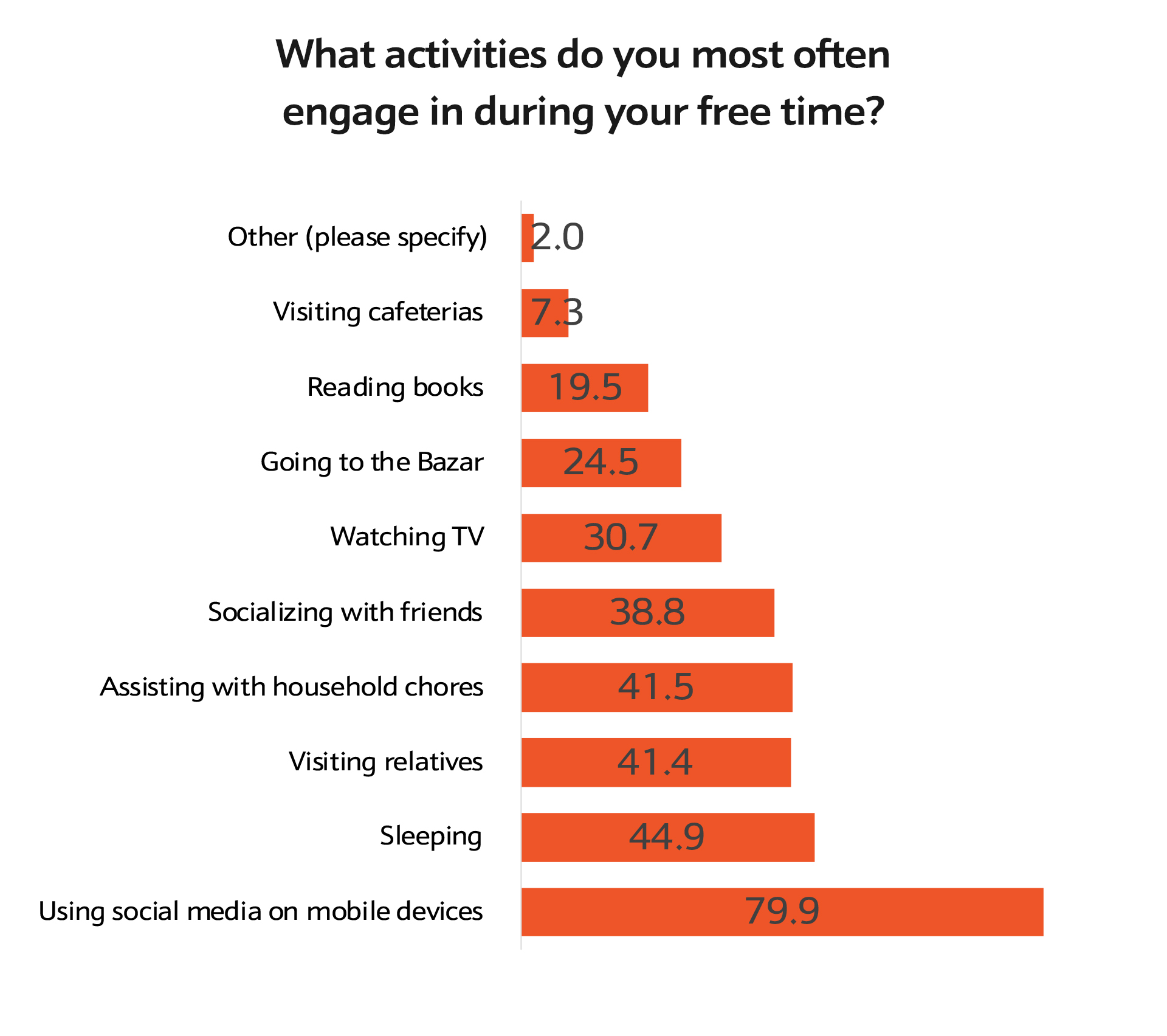
When it comes to leisure time or free time, social media usage stands out as a prominent activity for young people. When they have free time, 79.9% of respondents report using social media on their mobile devices. Additionally, 41.5% engage in household chores, 44% preferred sleeping, while 38.8% enjoy socializing with friends. Overall, young people in the Kurdistan Region predominantly focus on personal pursuits during their free time and have limited access to cultural and social activities. The prominence of family bonds, narrow social circles, and specific categories of activities suggest a more conservative identity among young people in the region.
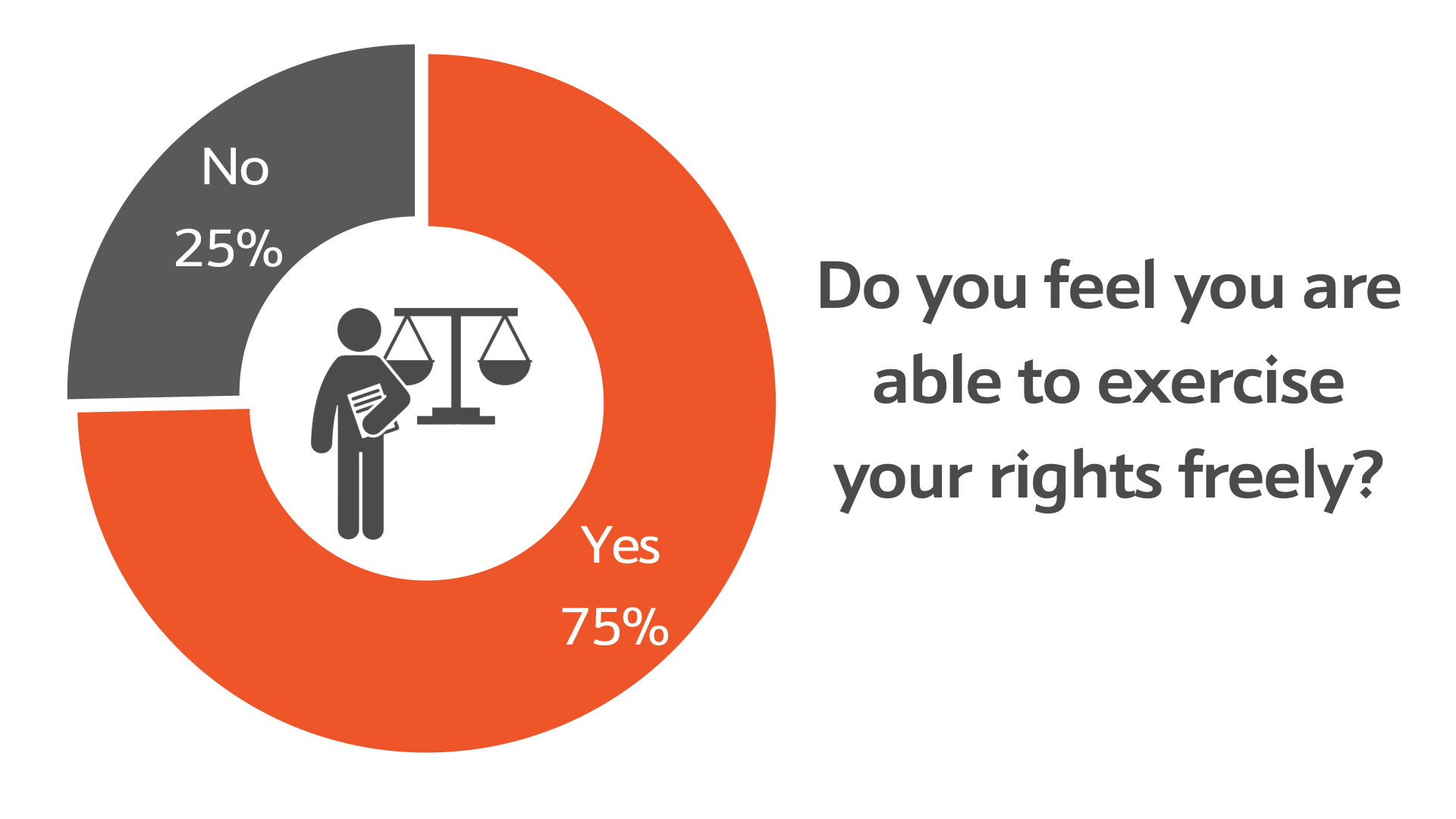
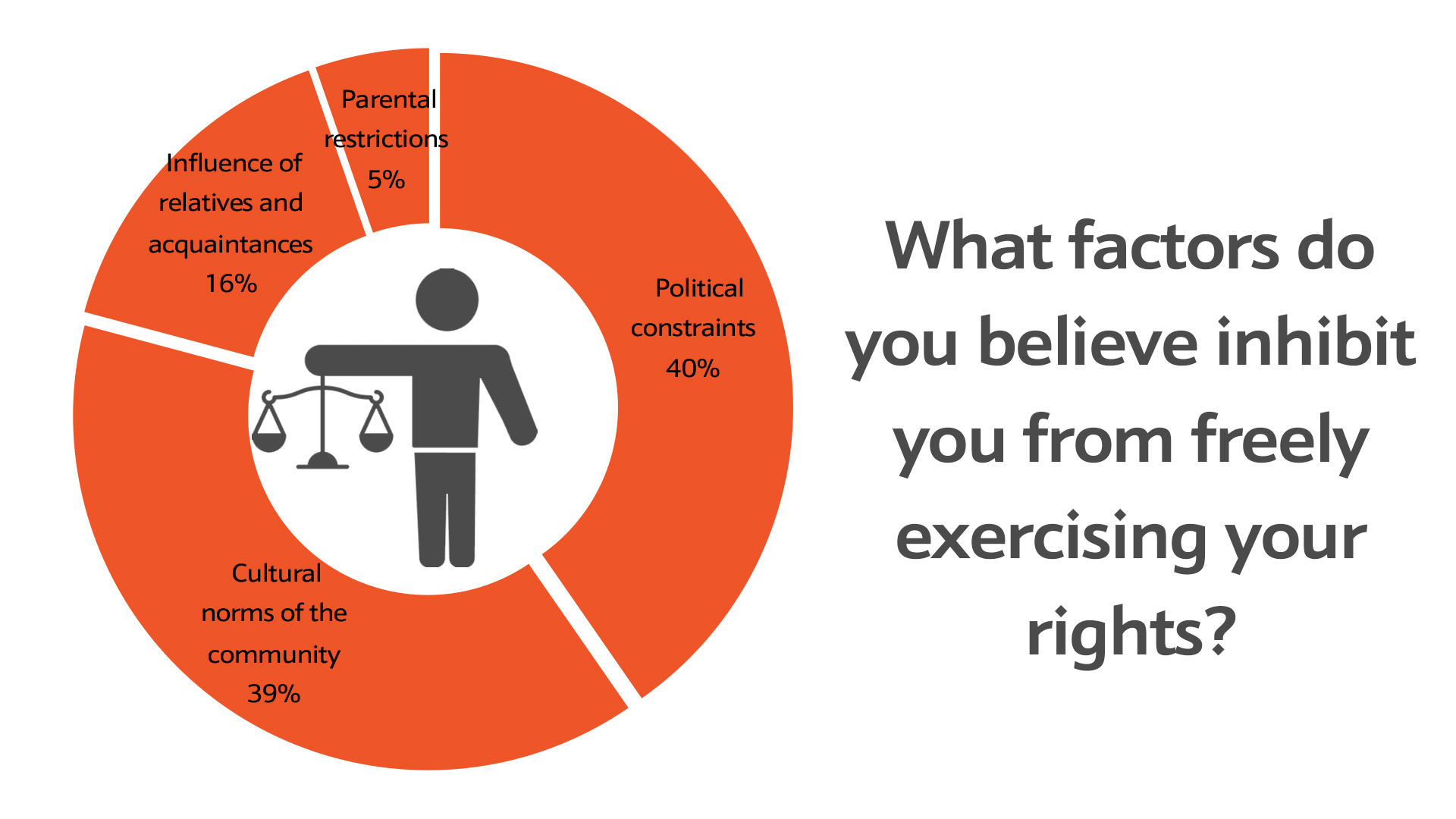

As for exercising their rights, 74.7% of respondents believe they can freely do so, while 25.3% disagree. Among those who feel constrained, political and cultural factors within society are cited as obstacles to their freedom. In the Kurdistan Region, 83.9% of young people strongly believe in individual liberty. However, 85.5% of respondents believe that girls or women should not travel alone, primarily due to religious, cultural, and public perception reasons, with a small percentage expressing opposition due to a lack of security and public transportation facilities. In general, they possess two distinct traits, they believe in individual freedom, but on the other hand, they reject it.
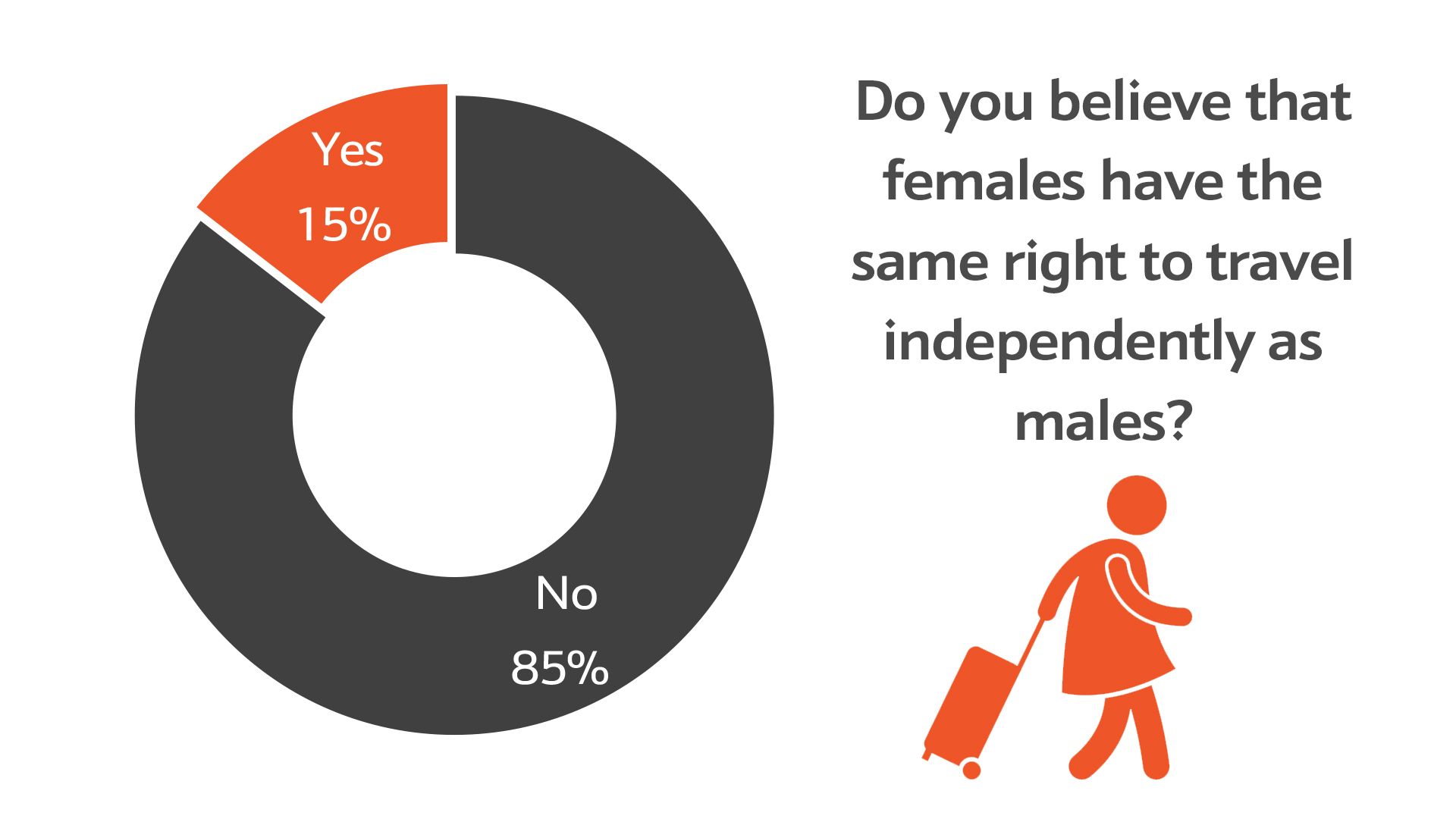
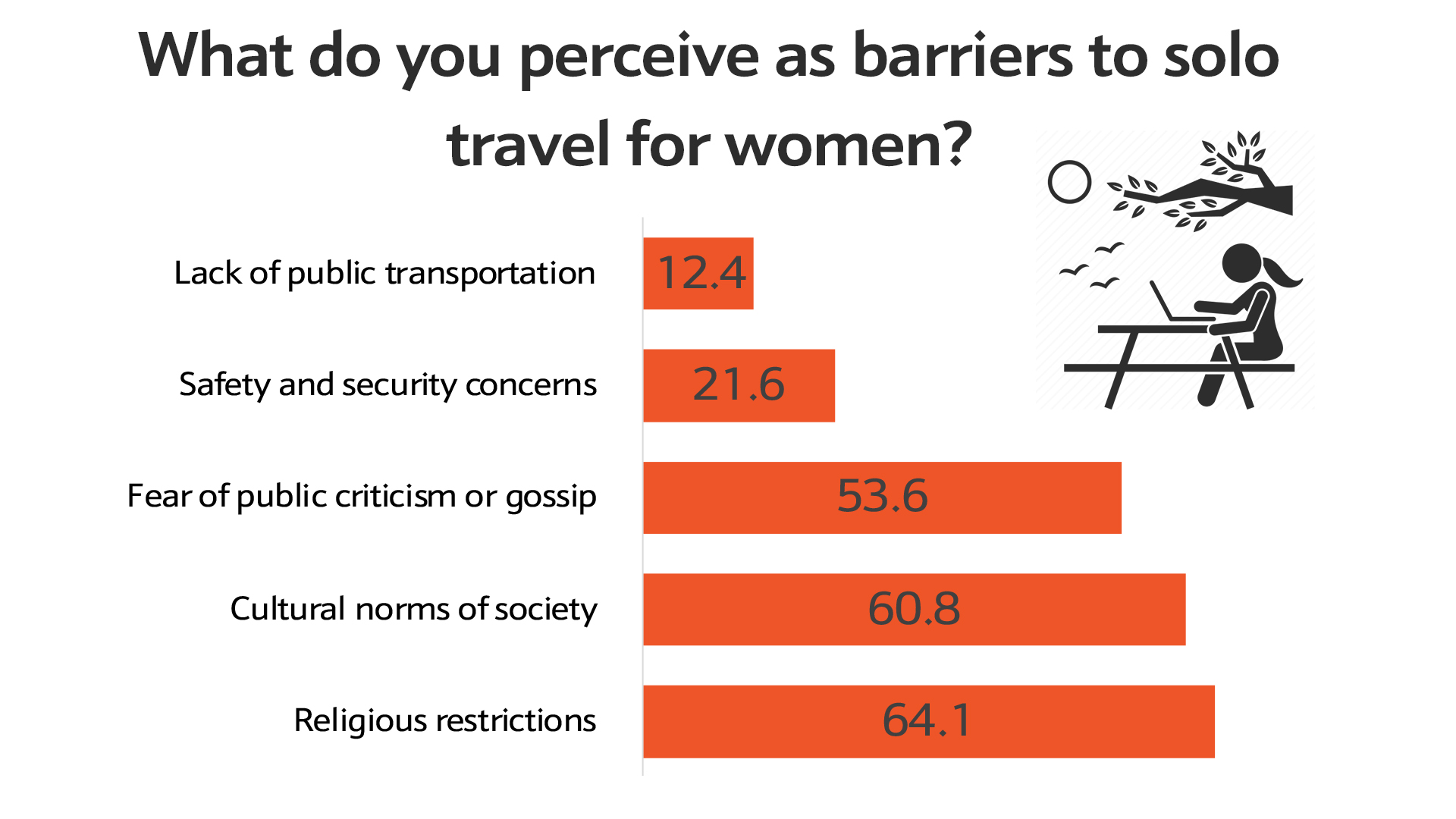
Youth and Social Media Use
The survey gathered insights from young people in the Kurdistan Region regarding their usage of digital platforms and their preferred instruments for media consumption and information search on the internet. The findings revealed that 65.7% of young people in the region use Snapchat, 62.1% use Facebook, and 52.7% use Instagram. This shift in behavior indicates a change in social media preferences among young people in the Kurdistan Region, as Facebook was previously the primary platform. In a previous survey titled "Impact of digital platforms on the political, social, and economic situation in the Kurdistan Region," conducted the previous year, Facebook had the highest usage rate among young people aged 18-24 at 87.4%, followed by Snapchat at 86.4%, Instagram at 83.4%, and Messenger at 76.9%. This demonstrates the adaptability of young people in choosing their preferred digital channels. Globally, 65% of people use Facebook and YouTube, according to the Reuters Digital Media Report (2023). This is followed by 63% using WhatsApp, while Snapchat is used by only 11% of the population, primarily popular among young people in the Kurdistan Region.
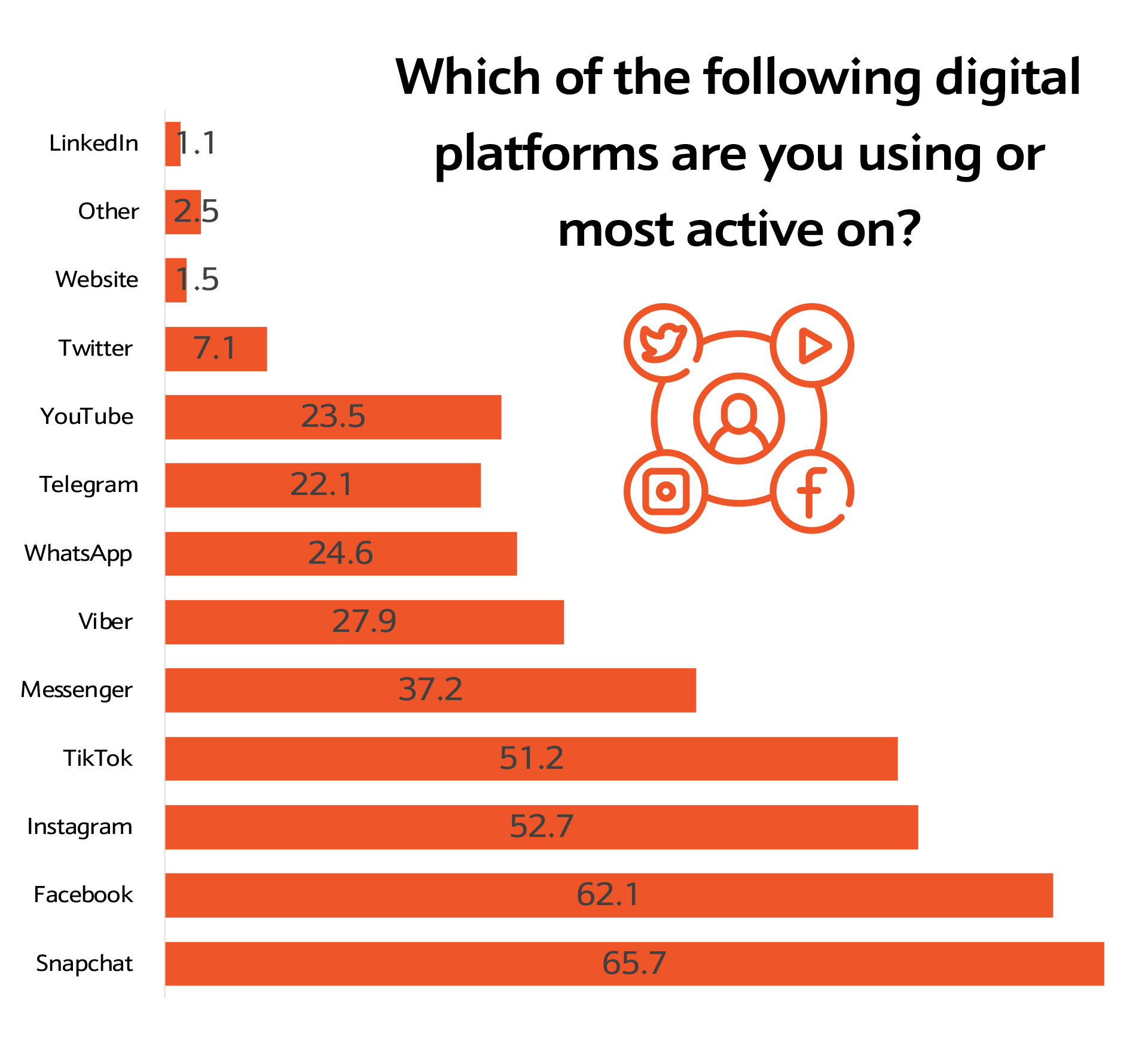
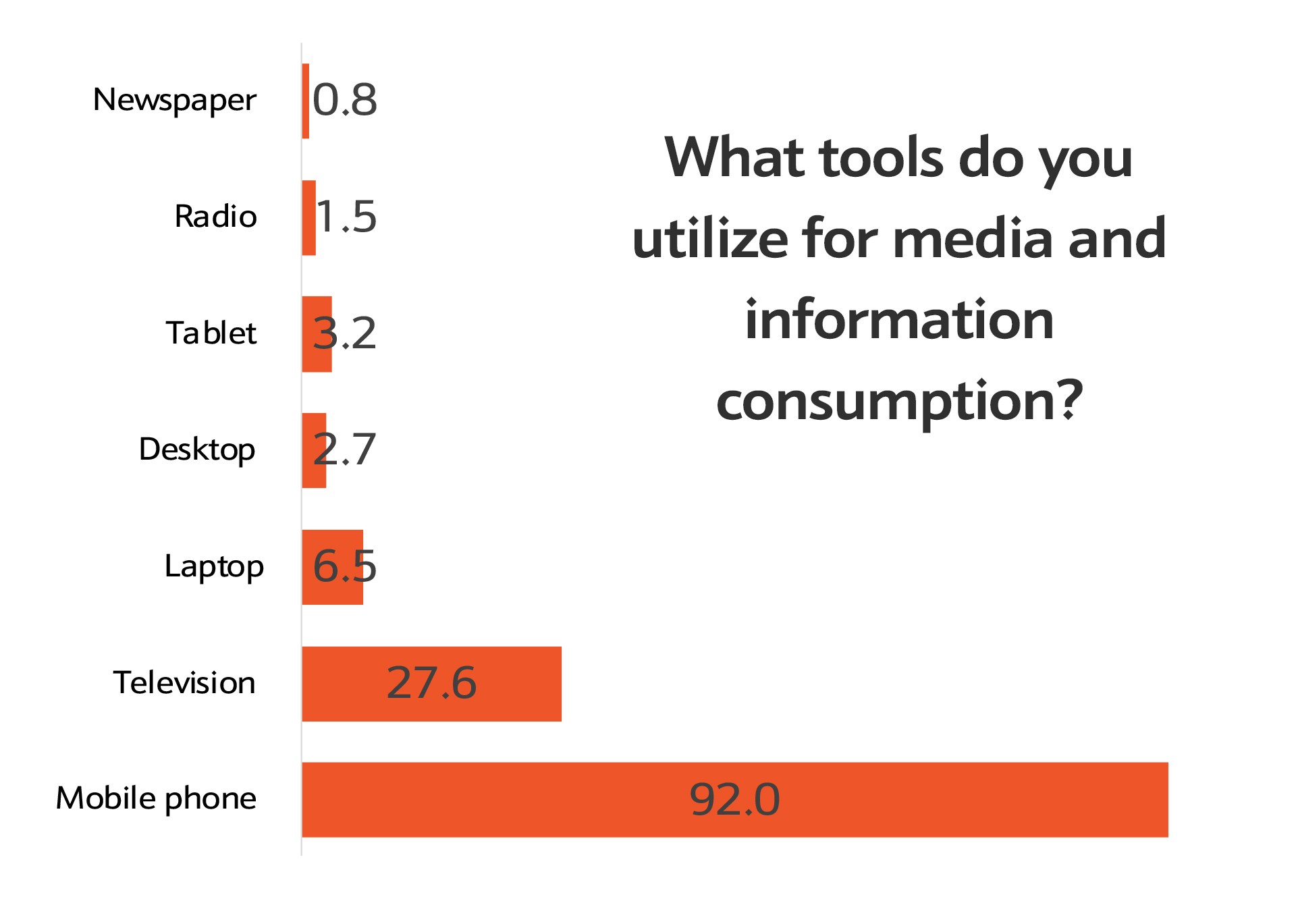
At the Kurdistan Region level or stage, 92% of young people use mobile phones as their primary device, and 27.6% rely on television for information. Other devices such as computers, tablets, radios, and newspapers are utilized by less than 5% of the population as tools and sources of information. The decline in usage of these alternative sources of information, apart from mobile phones, is not limited to young people in the Kurdistan Region but is a global trend, as indicated by the Reuters Institute reports. In terms of online activities, the majority of young people in the Kurdistan Region (73.2%) go online for entertainment purposes, followed by 62.2% seeking information and 30.6% searching for news. A smaller percentage (10%) utilize the internet to explore job opportunities, 9.4% work online, and 11% use it for socializing and creating relationships. These subjects were among the topics addressed in the study. Another research on the impact of digital platforms in the Kurdistan Region revealed that young people in the region spend an average of 4 hours and 42 minutes on social media daily.
